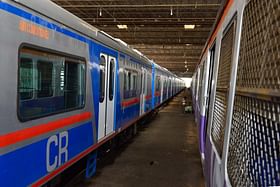Catering to meet the demand of lower income passengers, Indian Railways will soon run regular non-AC long distance trains for which routes have been identified.
There is always heavy flow of passengers, particularly migrant workers travelling to big cities seeking livelihood opportunities, from regions such as eastern Uttar Pradesh, Bihar, Odisha, Bengal and Jharkhand to cities including Delhi, Mumbai, Surat, Ahmedabad, Bangalore, Chennai and parts of Punjab.
According to the Railways, the train services on these routes will start before the next Lok Sabha election in a move that is expected to take forward the government’s pro-poor approach in an election year.
The routes have been identified after studying the pattern of waitlisted tickets and assessment of high numbers of passengers on origin-destination services.
Unlike seasonal special train services which are introduced as per high demand peak seasons, these will be permanent trains aimed at reducing pressure on the other trains plying the routes.
In the past nine years, the Railways has laid nearly 20,000 route km of new tracks. So, it has got additional capacity to run more trains.
The national transporter is also taking steps to make the travel comfortable and safe, by replacing the remaining 20,000-odd old conventional coaches with safer Linke Hofmann Busch (LHB) coaches, in the next three years.
In the next 4-5 years, all the coaches will also have new features such as “plug doors” to prevent accidents like passengers falling off, as the trains will not start unless the doors are shut.
The system will be on fail-safe principle, meaning in case of a crash or emergency, the doors will open automatically.
The Railways have considered the historical data and origin-destination patterns. The trains will run from areas that send a huge number of migrant workforce to employment hubs.
Soon after the Covid-19 outbreak, the Railways had to run hundreds of special Shramik Express trains on these routes to bring back migrant workers home from big cities.
The Railways will also reduce the types of passenger coaches on its network to two, from the current range of 28.
In the next 5-6 years, there will only be LHB and Vande Bharat type coaches on the Indian Railways.
This will help the national transporter to manage maintenance costs. The Indian Railways has earmarked Rs 9,792.88 crore under the materials for repairs and maintenance head, in the Budget 2023-24.
The maintenance cost can come down by 40 per cent with the standardisation move, the Railways maintains.
Changes are being planned in the design of LHB coaches to make them safer for passengers.
Open doors in coaches during the journey will soon be eliminated. The train coaches will also be retrofit, to ensure that harm to passengers is minimised during accidents.


